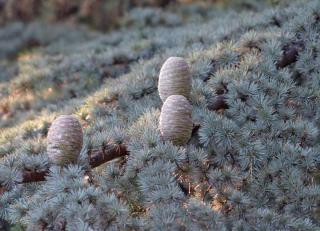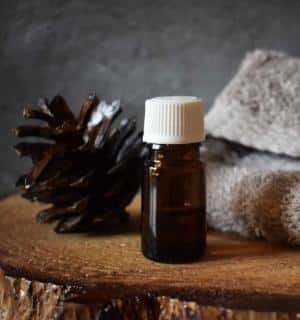

Though its botanical name is “Cedrus atlanta“, Atlas cedar isn’t native to Atlantis… It hails to us from the Atlas mountains in North Africa! The essential oils extracted from this tall tree boast many health benefits.
A hardy and ornamental tree, Atlas cedar has a stupendously long lifespan: from 1000 to 2000 years! It grows very slowly. Be it during the cold, snowy winters or in regions devastated by drought, it grows easily on deep, chalky and well-drained soil. This towering tree with scented wood is often included in public parks and gardens.
This cedar belongs to the Pinaceae family, and it produces an essential oil that is famous for its health and beauty benefits.
The word cedar comes from ancient latin “cedrus”, which itself came from even more ancient greek “kedros”, which was a catch-all term that designated several Mediterranean trees, like juniper for instance. According to ancient writings, cedar was already bound with the gods even before Roman and Greek times.
 The ancient ones considered it a symbol of immortality and the Egyptians – who used it for divinatory purposes to communicate with the gods – used its wood to carve their sarcophagus and statues of their gods. The Ancient Greek would burn it during bloody sacrificial rituals.
The ancient ones considered it a symbol of immortality and the Egyptians – who used it for divinatory purposes to communicate with the gods – used its wood to carve their sarcophagus and statues of their gods. The Ancient Greek would burn it during bloody sacrificial rituals.
Also venerated in Asia, Atlas cedar appeared in sanctuaries tended by Japanese monks, and was planted in fenced-out sacred sites in certain parts of China. First introduced in Europe towards 1841 as a reforesting effort along the slopes of the famed Mont Ventoux, the species then spread across the South Europe to this day.
Not to be mistaken for the Lebanese cedar, Atlas cedar has a triangular shape and reaches heights of 75 to 150 feet (25 to 50 meters). Its silhouette has a wide, conical tip, the bark is gray, branches spread out to great distances. Short, evergreen leaves shaped like needles are grouped into rosettes, and the triangular winged seeds are housed in fruits shaped like cones.
Apart from its spiritual, artistic and environmental benefits, the reputation of this cedar is also due to its therapeutic properties. Atlas cedar contains many active compounds, proteins and tannins. Specifically, the fragrant essential oil that’s extracted from its leaves is noted for its antifungal, astringent, scar-healing, anti-seborrheic, diuretic, antitussive and antiseptic properties. It also has lipolytic (eliminates fats), relaxing, lymphotonic, sudorific, antidandruff and draining activity.
In aromatherapy, Atlas cedar essential oil was used to treat cystitis, chronic anxiety, urinary infections, a few specific skin (dermatosis, eczema) and respiratory diseases (common colds, flu, cough, bronchitis). The plant oil extracted from Atlas cedar also had uses in cosmetics: it helped treat oily skin, hemorrhoids, acne and oily hair. Very fragrant, the essential oil of this majestic conifer is also recommended in medicine to treat atherosclerosis. From its sap is yet another useful substance extracted that helps repel mites and mosquitoes.

To treat oily hair that results from excess sebum, the recommendation is to use a few drops of cedar essential oil in your shampoo, and to massage your scalp after rinsing it off.
As regards urinary trouble, it’s mandatory to consult a therapist before ingesting any. Indeed, on top of potentially triggering skin rashes and other neurological issues, cedar essential oil should not be used pure nor in high doses, particularly for pregnant women and for young children (under 10 years old), and, lastly, not for persons subject to epilepsy.